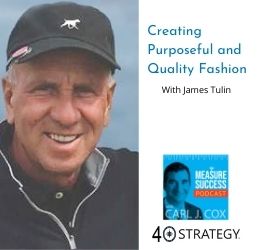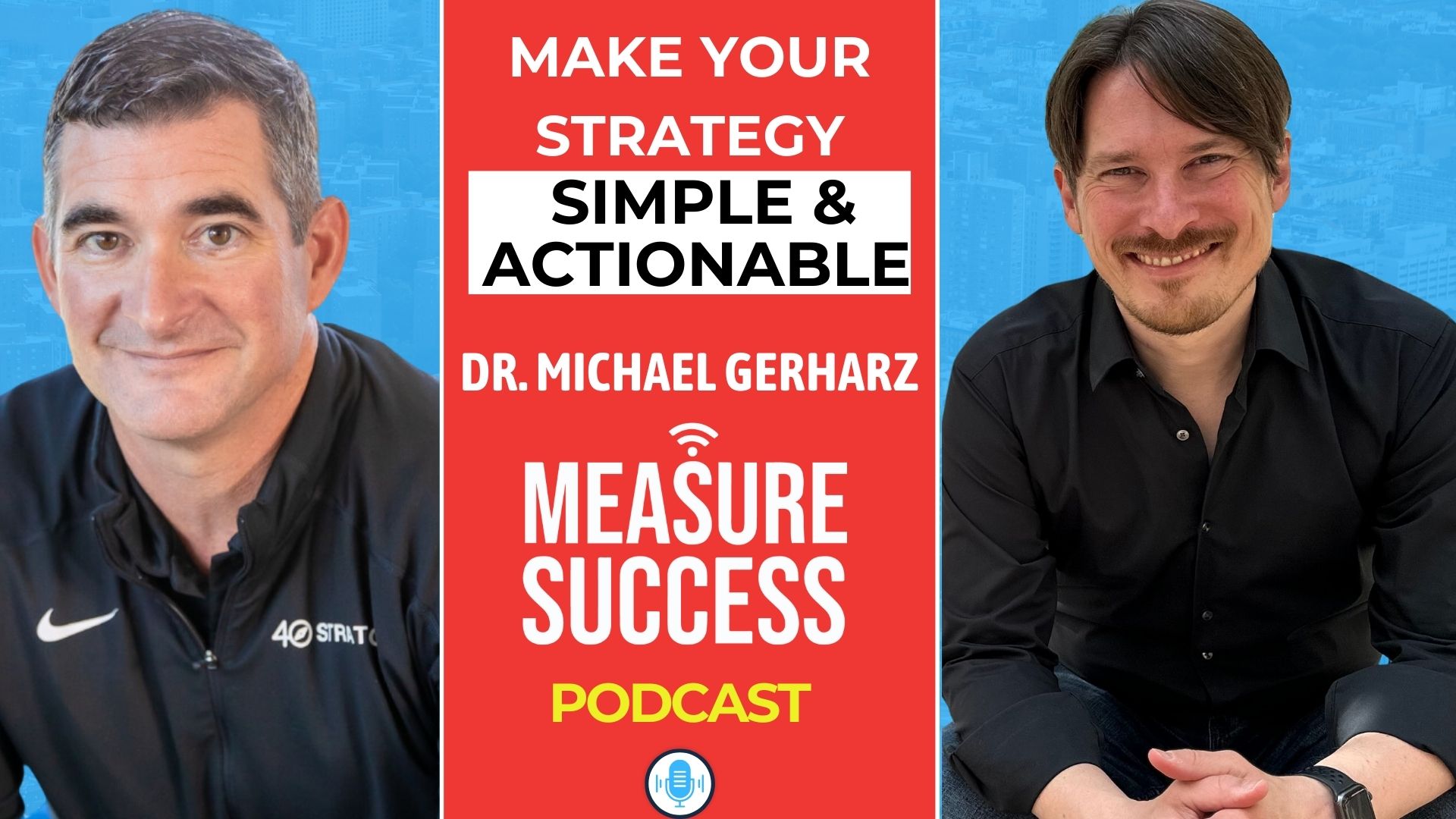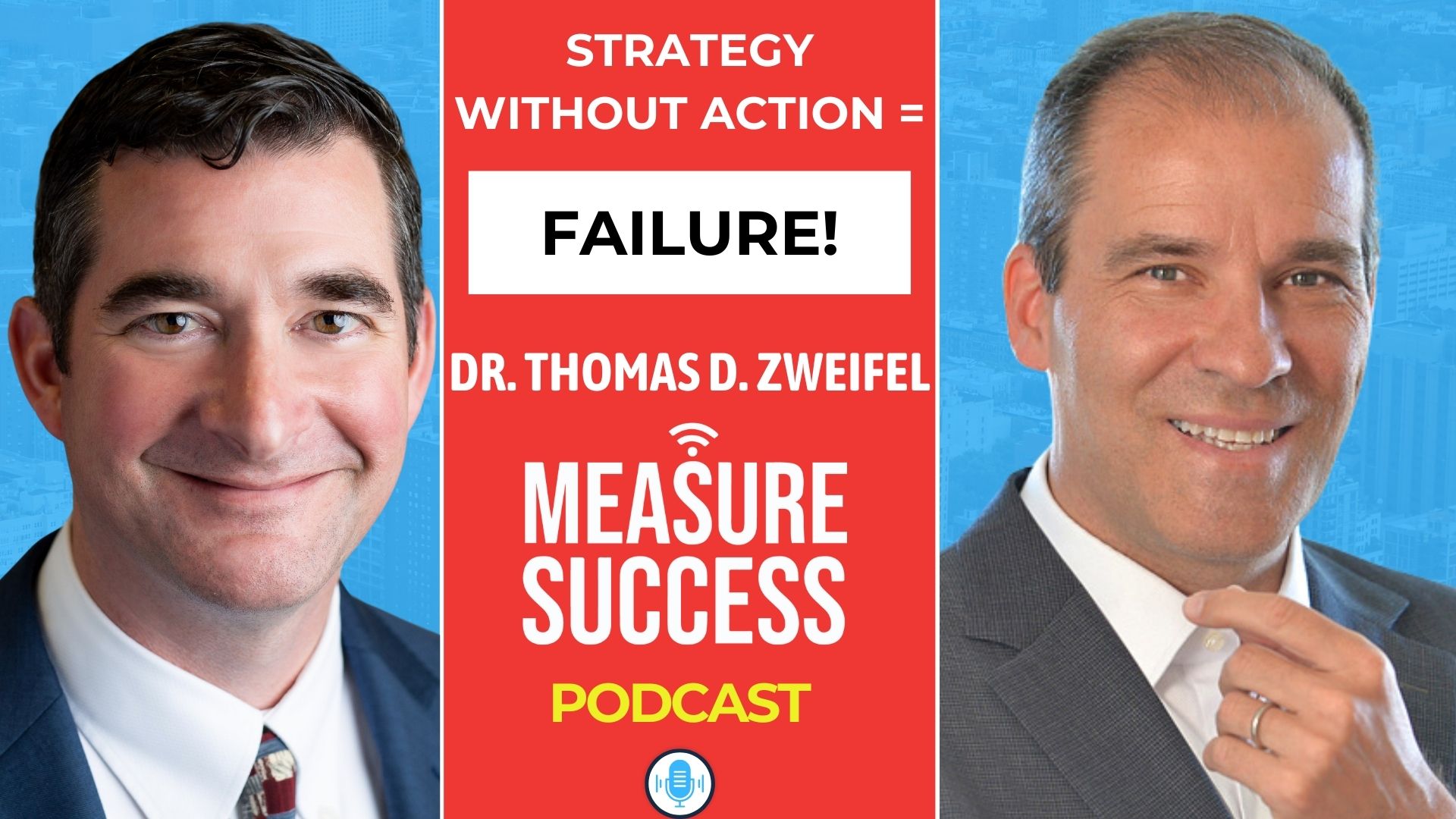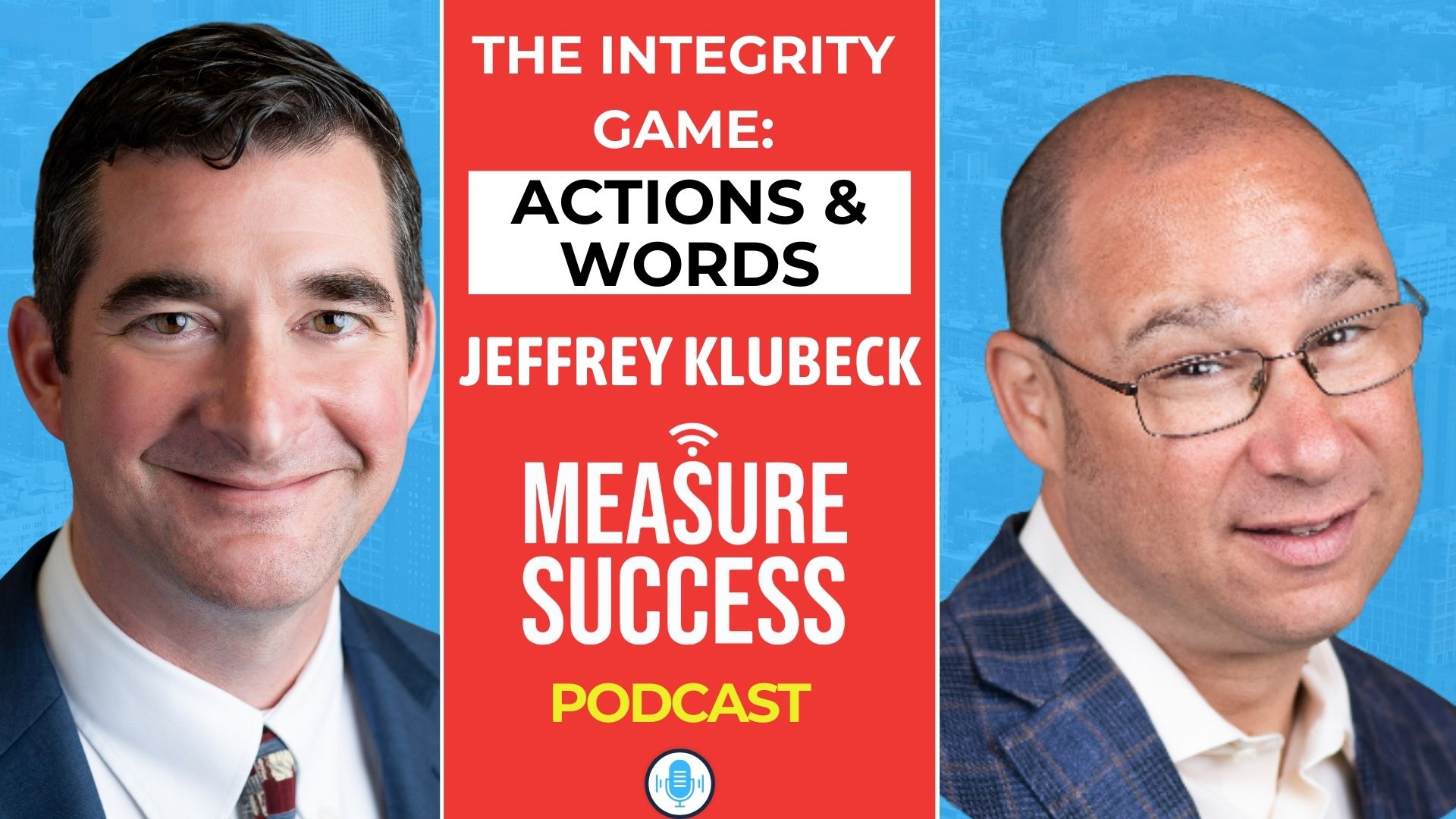
His storied career has expanded his expertise in the industry, from sales and product development to the supply chain business. James has served as SVP, Director, and Principal of Swank Inc. and holds a black belt in Taekwondo.
Here’s a glimpse of what you’ll learn:
- James Tulin talks about his passion for manufacturing quality products
- Why the quality of the material is crucial for a brand
- The importance of content for marketing your product
- James discusses how he measures metrics from a customer standpoint
- How James discovered Taekwondo and his focus on the inner self
- The moral obligation and perseverance required to obtain a black belt in Taekwondo
- Why you should keep your eyes set on the destination
- James discusses one of his favorite books on martial arts
In this episode…
Your product is a reflection of you. The manner of engagement and construction of a product is what will take your brand from sub-par to high fashion. Developing quality products through quality goods is one way to establish life-long relationships with clients. So, how can you exceed the customer’s expectations and create the valuable brand you envision?
James Tulin has over 35 years of experience in the fashion industry and pours his love and passion into the products he develops. He knows in order to have great success, you need to have passion for what you do. According to James, the key ingredient is the product — and constructing high-fashion products starts with passion behind manufacturing.
In this episode of the Measure Success Podcast, Carl J. Cox talks with James Tulin, Founder and CEO of Oxford Hounds Inc., about his passion for his products and delivering superior customer service. James explains the importance of creating products with incredible care and quality and how chance brought him to the world of Taekwondo. Stay tuned!
Resources Mentioned in this episode
- James Tulin on LinkedIn
- Oxford Hounds Inc
- Invest in Oxford Hounds
- James’ email: jim@oxfordhounds.com
- Justin Buell on LinkedIn
- 40 Strategy
- Contact 40 Strategy
- Carl J. Cox on LinkedIn
Sponsor for this episode…
This episode is sponsored by 40 Strategy.
40 Strategy provides strategic planning and consulting to help organizations realize and achieve their dreams by creating and measuring KPIs for success.
Unfortunately, most organizations only spend 2% of their time — or about 40 hours per year — on building an effective strategy.
Increasing the success of those 40 hours is what 40 Strategy does because your success is their passion — and that’s why organizations look to them for guidance.
Not only does 40 Strategy help you craft and implement an effective strategy, but they’ll also work to facilitate teams with proven practices and help with your scenario planning.
Harvard research shows that you can triple your success when you use the right Key Performance Indicators. Who doesn’t want that?
If you have questions, you can reach out through their website or email them at catch@40strategy.com.
Episode Transcript
Intro 0:03
Welcome to the Measure Success Podcast where we feature top leaders on how they measure success in their business and life. Now, let’s learn from their experiences.
Carl J. Cox 0:18
Carl J. Cox here and I’m the host of the Measure Success Podcast where I talk with top leaders about effective strategies that inspire success. This episode is brought to you by 40 Strategy. At 40 Strategy, we provide strategic planning consulting, to help organizations realize and achieve their dreams. Jim, basically what we do is we help companies and organizations create strategic plans and measure the right KPIs for success. what’s crazy is that only about 10% of organizational organizations actually accomplish two thirds of their strategic objectives. And I don’t know about you, but that is not a very high bar. Would you agree with that, Jim?
James Tulin 1:00
Yeah, I would say so. It’s pretty poor.
Carl J. Cox 1:03
But that’s, that’s what the facts are and, and so that’s why organizations call on us to help. Not only do we come up with strategy, but with proven practices to actually help them execute it. Harvard research shows that when you focus on the right key performance indicators, you can actually triple your success. Do you want to learn more, please contact us you can email us at catch like catching a ball at 40strategy.com or you can go on our website at 40strategy.com. And with that, we before we transition over, we’d like to I like to always have a shout out for each partner. And this shout out is for Justin Buell. He’s a financial advisor at Wells Fargo. He’s one of the top financial advisors in the world. You’ll probably be hearing more about him over the next decade as he continues to grow what he’s doing. I just want to say a big thank you how you’ve helped out clients that I have, you’ve helped out ourselves and even even had were kind enough to have my son do a walker walkabout to actually see how you’ve been a top performer. So anyways, I just want to say thank you for that Justin. And with that we’re going to introduce our desk or excuse me, our guest, Jim Tulin. Jim is the founder and CEO of Oxford, Oxford Hounds, a DTC men’s luxury lifestyle company that employs proprietary technology and predictive analysis analytics to help the male luxury consumer shop for fashion apparel and accessories at a significantly less than retail prices. Jim has more than 35 years experience in the men’s fashion industry serving as SVP director and principal of Swank Incorporated. Jim has also had the fortune to act as a direct liaison to some of the most notable global brands, including Ralph Lauren, Tommy Hilfiger, Guess, Nautica and others. Jim’s experience has also afforded the opportunity to have been a part of and privy to the inner workings of a NASDAQ listed company, which has provided a significant depth of knowledge in numerous facets of the business, from sales and product development, supply chain and logistics, as well as 27 years of serving as a director, providing a deep understanding of the financial side of a large public Corporation. Jim, thank you so much, and welcome to the show.
James Tulin 3:12
It’s my pleasure. Thank you for having me.
Carl J. Cox 3:15
So for those who aren’t familiar with Oxford Hounds, please share more about it. Tell us more about Oxford. What does it do? What do you what do you plan to do? What’s the vision behind this?
James Tulin 3:25
Well, the vision behind this is I spent my entire life in a very large, as he said NASDAQ listed company, we were a very moderate price seller of licensed powerhouse names to every major department store on the planet. And we sold our company after being in business for 115 years and decided it was the right time for a variety of reasons, which I will not bore everybody with but it was a strategic move on our part to make the move. And fortunately, the timing could never have been better. So I spent about the last three and a half to four years doing a great deal of market research because, as I said, our former company was a very moderate price seller product, but my real love is high and high quality fashion. And having spent my life dealing with a retailer I saw an opportunity long before COVID or the demise of brick and mortar Rickard to take our products take whatever products developed and go directly to the consumer, as opposed to keeping your fingers crossed and hoping that someone walks into Macy’s Herald Square in New York, and falls upon our product that’s even if it’s put out. So I took this vision that I’ve had, God knows how many years of this high end high quality, men’s apparel and accessories company started to put pen to paper. To which the first thing that I did was recognize that I wanted all my goods made in Italy. So we also recognize it based on the type of person Being very classic, that selling through a computer monitor, we needed to come up with something that was very engaging to the consumer, and would separate us from what could be compared to a 1499 men’s dress shirt at Walmart and never being able to tell the difference between the two. Because we all know the impact of online reviews. And that engagement is so powerful that there’s got to be a reason for you to do to be different. Because if you’re not different, you have no chance. So I’ve had a lot of experiences you mentioned in a lot of different areas. And I started to put this whole thing together, I spent about five months writing a business plan that nobody ever read except me. And it really was quite easy to do that it took me about three weeks to do it. And the balance of the time was cleaning up my horrible typing and grammar. But it’s a fabulous roadmap. And for any of you out there that are listening, that are thinking about starting a new company, the first thing you should do a never be discouraged and let anybody tell you otherwise, it you can’t do this because you can and be right out a game plan, write out a road map, even if it’s only for you, you’d be surprised how helpful it can be, even with some with my degree of experience. So I started to put all of this together and found strategic partners in Italy to make my product that understood my values and my aspirations. And when raising capital just to jump for a second, we always talk about is it a good fit for the investor? Well, when getting into bed with someone to manufacture your lifelong vision, you’ve got to make sure it’s a good fit for you as well. And lo and behold, here we are, with my product being incredibly spectacular and unique. And receiving accolades from the finest manufacturers in all of Italy, who make the world class brands like Gucci and Ferragamo, and Taj, and Versace, and all the names that you know, who are telling me that my product is going to set the world on fire. And the best part of the equation is, is we’re in a $750 billion vertical, that’s due to grow to a trillion dollars by 2025. And it’s the fastest growing segment in all of e commerce. And Carl, I’m exhausted from that. telling you all that stuff. Oh, my God, how the hell did I get to this point?
Carl J. Cox 7:34
Well in and so that’s, that’s incredible. So even since we’ve last chat, you’ve had some sounds like you’ve had some early wins. But so give us some examples for the audience. What type of product you’re referring to, you know, what, what is an example you’re talking about men’s luxury, good items, give me example, what that sounds like,
James Tulin 7:51
looks like what is what does luxury mean? luxury has a two pronged effect. If we’re talking about a specific customer segment profile, luxury could just be that the logo that they that imparts to them that this is very expensive, very well received and will impress all their friends, luxury. And then there’s luxury, that is incredible care and quality in the manufacturing, incredible quality and in the manufacturing of the materials used, the manner in how it’s constructed. The passion behind the manufacturer who’s making the goods, that this is not a 3000 worker factory in wherever they may be, I won’t even go into that. But rather, a crew of 10 people that have been doing this for the last 90 years that love what they do that to then the execution of the product, the quality of the product, speaks not just about, gee, isn’t this great looking. But rather it’s a reflection upon that. So when we chose the manufacturers, I made it very clear, even though I didn’t have to, but I made it very clear that I want their their love and passion in my product, like I have, and that they can’t put that into my product. They had the wrong fit the wrong fit. So I was very careful who’s manufacturing these goods? Because as a consumer, you Carl, if you buy my product, it’s a reflection of me, isn’t it? So I want my goods to come off as if we did everything conceivable to create the greatest value proposition, which is a very much football concept that everybody uses to try to convince the consumer that they really care a lot when maybe they don’t. But the product is the key ingredient because Doesn’t matter how much you spend on marketing, if your product sucks, you got a real problem. You’re not going to sell it. That’s bad. Right? So products number one.
Carl J. Cox 10:11
So in like some specific like, what what are like some specifics that we talked about shirts we talking about? suits are we talking about, you know, give me some examples.
James Tulin 10:21
Okay, like, we’re talking about polo shirts and casual shirts, and we’re talking about, um, belts and wallets. I’ll give you a perfect example. Many years ago, I was in a tannery in Santa Croce, which is south of Florence, where there’s about 400 tanneries that manufacture leather for every famous brand in the world. In Italy, typically, cities have their specialty in what they do. So in como, in the north of Italy, that’s the silk capital of the world center crochet south of Florence. That’s the leather capital of the world. So I would say 20 years ago, I’m in this factory. And at the time, Gucci was producing a leather called master calf, which uses this magnificent high quality calf, but had a very high sheen to it, excuse me almost look like it was patent leather. It’s so happened that the day that I was there, the Gucci leather expert was there. And I watched him with what he did, when he was inspecting the leather, he had this white pen, and he would take each high, which was kind of big, and he’s taking this white pen, and he’s circling various areas. Why? Well, think about leather, where’s it come from? Its natural, God given material, it has flaws. Think about the cows in the farmlands, they go up against a fence, they get tick marks, they get bite marks. There’s imperfections. The difference between a typical leather belt, if it’s leather anymore, Carl, at moderate prices, which it’s not usually man made materials, but take a leather belt that let’s say cost $45. They’ll take this hide, and they’ll close one eye. And they won’t be circumspect about the parts that have damages do it. And they’ll use it and they’ll hide it. The manufacturers. Example with Gucci is this throwing out 80% of every hide, well, and only using the top 20% Oxford Hounds with throwing out 80% of the average height. And using the finest full grain, cow hides, calf skins, lamb skins, anywhere, why? It’s my mission. It’s my love. And I have no middleman to share profits with. So I’m going to make sure that my competition, I’m going to blow them away with my quality. And the same holds true with the quality of the materials that we use in our shirts. Not only the quality of the materials being such that they’re so superior to the average shirt, all you got to do is steal it, pick it up and feel it. And we’re going to help engage the consumer in our marketing strategy by sending out lookbooks with swatches in the materials so they can see and touch and feel because that’s the litmus test. So are our buckles in our belts are only manufactured from the finest material, which is solid brass, and not much less cheaper materials that many manufacturers wholesalers use. But we’re not selling belt buckles, we’re selling jewelry that just so happens to be attached to a belt and the amount of detail. It’s so obvious that it’s obvious. And the quality will just hammer the consumer over the head without us even having to say a word. Sounds compelling, doesn’t it?
Carl J. Cox 14:09
No, it does. I love it. So which leads me to my next question. You obviously have massive passion and experience and depth and you know where you try to accomplish you’re trying to create this great quality product but you made this comment about middle you get rid of the middleman which by definition should mean you have higher margins right to be able to be able to deliver at an affordable price. So a more affordable question say question is is what is going to be what do you what do you see as your key go to market strategy because there’s so many people out there in the world, right? There’s so many things, there’s so many distractions, how are people going to what is your key go to market strategy to help get people to click on Oxford hands to buy one of your products.
[continue to next page]











